
Kernel Agroholding’s assets in the port of Chernomorsk were subjected to a massive missile attack from Russia on Wednesday and suffered significant damage, the company said in a statement on the Warsaw Stock Exchange.
“The company’s grain handling facilities as well as grain stored at the Chernomorsk port were significantly damaged. Initial assessments indicate that it will take considerable time to return the assets to working condition,” Kernel said.
Reports of the damage led to a collapse of the share price on the exchange from PLN13.53 to PLN12.34 and high volatility: at one point they managed to recover the fall, but by 15:00 local time they were quoted at around PLN12.7-12.9, about 5% below the opening price.
As reported, the company’s CEO Yevhen Osipov in early July at a meeting of the grain club of the Ukrainian Grain Association reported on the need for further development of alternative corridors for export of Ukrainian agricultural products already built on the Danube and assured that Ukraine can fulfill forward deliveries through them.
Before the war, Kernel Agroholding ranked first in the world in the production of sunflower oil (about 7% of world production) and its export (about 12%). The company is one of the largest producers and sellers of bottled oil in Ukraine. In addition, the agroholding is engaged in the cultivation of agricultural products and their realization.
The largest co-owner of Kernel through Namsen Ltd. – is Ukrainian businessman Andriy Verevsky with a 41.3% stake, who recently proposed delisting the company from the Warsaw Stock Exchange and buying back shares from other shareholders.
Kernel’s net profit for the first nine months of 2023FY (Jan-March 2023) rose 36% to $437 mln, while revenue fell 45% to $2.715 bln.
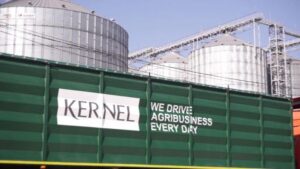
Ukrainian agro-industrial group Kernel signed an agreement to expand cooperation with Polish fuel importer Unimot Group, the company reported on Facebook.
“With the start of a full-scale war, we, along with other market participants, were forced to reorient fuel supply chains. In the midst of this process, Kernel signed its first formula contract with Polish fuel importer Unimot Group,” the agricultural holding company’s press office noted.
According to the agreement signed during Petroleum Ukraine 2023 conference, the Polish company will supply fuel, lubricants, bitumen and gas to the holding. For its part, Kernel will develop the storage and transport infrastructure and use mutually beneficial financial mechanisms.
The companies also agreed to cooperate in solar energy and projects aimed at decarbonizing production.
Unimot Group is the leader among Polish importers: 1.8 mln cubic meters of annual sales, 9 fuel terminals with a total capacity of 350 thousand cubic meters. The company owns a network of AVIA petrol stations with more than 3,200 stations in Europe.
Before the war, Kernel ranked first in the world in sunflower oil production (about 7% of world output) and its export (about 12%). The company is one of the largest producers and sellers of bottled oil in Ukraine. Besides, Kernel is engaged in cultivation of agricultural products and their realization.
Kernel cut its net profit in 1HFY2023 (July-December 2022) by 12.6% YoY to $370.31 mln, while revenues decreased by 41.3% to $1 bln 889.78 mln.
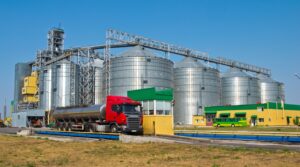
“Kernel, one of Ukraine’s largest agro-industrial groups, in the third quarter of fiscal year 2023 (FY, January-March 2023), earned $69 million in net profit, while it ended the same period last year with a net loss of $103 million.
According to a financial report on the company’s Web site, the agriholding’s revenue fell 51 percent to $825 million in the reporting period.
EBITDA for the third quarter of 2023FY was $155 million, compared to a negative $32 million in 2022FY.
Compared to the previous quarter, net income decreased by 67%, EBITDA – by 44%, and revenue – by 33%, Kernel said.
Agroholding attributed this decrease to a decrease in both volumes and prices.
The company added that the net change in fair value of biological assets resulted in a loss of $11 million in January-March 2023, compared to a loss of $74 million in the same period the previous year.
“Kernel also recognized a $20 million asset impairment loss in the third quarter of fiscal 2023.
It is specified that in the structure of EBITDA the segment of infrastructure and trade in the third quarter of FY 2023 decreased by 32% year-on-year to $71 million, but was higher by 15% quarter-on-quarter, which was facilitated by a high trade markup on grain of Ukrainian origin.
Due to a decrease in world prices for grains and oilseeds in January-March 2023, the agriculture segment posted a $24 million loss in the reporting period.
According to the report, Kernel managed to reduce its net debt to $833 million as of March 31 this year from $1.048 billion at the beginning of the year and $1.715 billion at the end of March last year.
At the same time, agricultural stocks decreased to $497 million from $593 million and $1.181 billion, respectively.
Overall, Kernel increased its net profit by 36% YoY to $437 mln and EBITDA by 11% while revenues decreased by 45% to $2.715 bln in 9M2003.
As reported, Kernel ended FY2022 with a net loss of $41 million compared to $506 million in net income in the previous fiscal year on revenue down 5% to $5.332 billion.
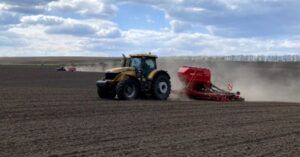
Kernel Agro-Industrial Group, as of mid-May, has fulfilled 95% of its plans to sow spring crops, allocating 35% of the area for sunflower and 18% for soybeans, the company said on Facebook.
“Agroclimatic features of the current season: a large amount of precipitation in March and April, a high level of subsurface water in some regions and, accordingly, the waterlogging of much of the fields – have significantly adjusted the production program of agricultural enterprises “Kernel”,” the company said in its information.
As reported, the sunflower accounts for 35% of sown area, or 120 thousand hectares, the corn – 24%, or 85 thousand hectares, the soybean – 18%, or 65 thousand hectares.
Moreover, winter wheat accounts for 17%, or 60.4 thousand hectares in the structure of areas under crops. Areas under rape and perennial grasses are traditionally insignificant, the holding said.
It is stated that Kharkiv cluster was able to carry out seeding on 28 thousand hectares, and another 1 thousand hectares were left without treatment because of security reasons, as these lands are located 40 km from the front line – in Kupiansky area. As of May 16, 100% of the planned areas for the season were sown in the cluster.
According to Alexander Zvyagintsev, deputy head of production of the Kharkiv cluster, 35% of the area is planted to winter wheat, 30% to sunflower, 15% to winter rape, 10% to corn, and 10% to soybeans.
Druzhba Nova” cluster team in Sumy region took 177 thousand hectares of arable land for the future harvest, while 7 thousand hectares near the Russian border were left uncultivated.
Druzhba Nova” cluster head for production, Igor Tihonchuk, said that corn and sunflower are already being sown; 20% and 35% of the crop is under crop cultivation correspondingly. Sowing of soybeans, which will take 24% of the area, will be completed by May 25. Sowing of winter wheat will occupy 17% of the area.
According to the holding, because of the oversaturated fields, some early spring technological operations have been canceled, replaced or shifted in time. The shift in timing affected the beginning of the sowing season, which in all regions began in late April, which is two weeks later than the traditional dates.
Kernel Agronomic reported favorable sowing conditions for sunflower and corn, which were sown in parallel to accelerate the pace of the sowing season.
“Most agroclusters have completed corn and sunflower seeding and are completing soybean seeding. This is a heat-loving crop, the conditions for sowing which were not favorable until May 5-6. Despite the vagaries of weather, 80% of areas for the next soybean crop we plan to sow at the optimum time for the crop, “- summed up the agricultural holding.
“Kernel” before the war was the world’s number one producer of sunflower oil (about 7% of world production) and its export (about 12%), as well as the biggest producer and seller of bottled sunflower oil in Ukraine. The company was also engaged in cultivation of other agricultural products and their sale.
In FY2022 (July-2021 – June-2022), the holding posted a net loss of $41 mln versus $506 mln net profit in the previous FY, while its revenue decreased by 5% to $5.332 bln and EBITDA decreased by 3.7 times to $220 mln.
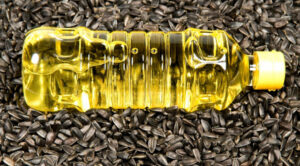
Kernel Agro Holding, one of the largest in Ukraine, processed 744 thousand tons of sunflower seeds in the third quarter of FY2023 (January-March), an increase of 32% compared to the same period last FY, operating six oilseeds processing plants.
“Vegetable oil sales in Q3 FY2023 increased only 1% from the same period last year to 273,000 tons, including 20,000 tons of bottled sunflower oil,” the company said on the Warsaw Stock Exchange.
According to it, two oil extraction plants belonging to the group remain inaccessible in the high-risk zone of Kharkiv region with regular shelling by Russian occupiers.
“The group managed to increase the utilization of its plants in January-March 2023 compared to the previous quarter, given the stabilization of electricity supplies in Ukraine and the expansion of the grain corridor,” Kernel pointed out.
Overall, in the first nine months of FY 2023 sunflower processing volume decreased by 8% – to 1 million 858.08 million tons, and oil sales – by 10%, to 819.96 thousand tons.
According to Kernel, due to the postponed 2022 harvest campaign, which was postponed until the winter of 2022/2023, elevator loading in the third quarter of FY 2023 reached an unusually high level of 687,000 tons. However, volumes for the first nine months of the season were down 34% from the same period last year to 2.7 million tons, reflecting a lower 2022 crop compared to the 2021 season.
It is pointed out that the volume of transshipment of export terminals in Ukraine in Q3 FY2023 almost halved compared to the same period last year to 1.1 million tons of grain, sunflower oil and meal, compared to 1.7 million tons of transshipment in the previous quarter.
“The Group’s export volumes are highly dependent on the operation of the “grain corridor” in the Black Sea. Although the grain corridor deal was extended in March 2023, it remains unclear for how long. “Moreover, in the last few days, ship inspections were completely stopped as the Russians refused to perform their duties to interrupt the initiative,” Kernel noted.
The company added that, in addition, stiff competition between Ukrainian terminals for quotas for agricultural exports through the “grain corridor” and the existing quota distribution mechanism are unfavorable for market leaders like Kernel, as historically smaller operators handling relatively smaller volumes have received disproportionately high quotas, making it impossible to maximize exported products.
“Recent import and transit restrictions imposed by neighboring EU countries further reduce agricultural exports from Ukraine,” the company pointed out, specifying that since the launch of the “grain initiative,” 87% of its export volumes have been shipped to foreign markets through Black Sea ports, 6% through Danube ports and 7% through domestic routes.
Continued difficulties with grain logistics in the Black Sea region led to a 61% year-over-year decline in grain exports from Ukraine in Q3 FY2023 to 0.8 million tons, Kernel added.
“To maximize operational efficiency, the Group gives preference to sunflower oil and meal ships rather than bulk grain ships (given the more attractive margins in the Group’s oilseed processing business), although this approach reduces grain export volumes, as logistics capabilities remain a key bottleneck,” the statement said.
According to him, the volume of transshipment of export terminals in Ukraine decreased by 52% to 3 million 504.59 thousand tons and grain exports – by 61% to 3 million 77.7 thousand tons in 9 months of FY2023.
“Kernel” also reported that at the time of the report and since the beginning of a full-scale invasion of Ukraine by the aggressor, 1405 employees of the Group were mobilized in the Armed Forces of Ukraine or joined the territorial defense units. Of these, 558 were demobilized and returned to work, 22 employees were killed, and more than 70 employees were wounded.
“Before the war Kernel was the world’s number one producer and exporter of sunflower oil (about 7% of world production) and the largest producer and marketer of bottled sunflower oil in Ukraine. The company was also engaged in cultivation of other agricultural products and their sale.
In FY2022 (July-2021 – June-2022), the holding posted a net loss of $41 mln versus $506 mln net profit in the previous FY, while its revenue decreased by 5% to $5.332 bln and EBITDA decreased by 3.7 times to $220 mln.
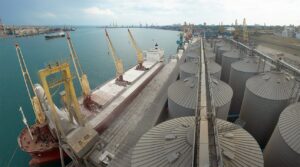
Kernel, one of Ukraine’s largest agricultural holdings, bought the Danube Prom Agro river terminal in the Ukrainian port of Reni on the Danube in February 2023, according to the company’s semi-annual report.
“The terminal has flat warehouses with a single storage capacity of 12,000 tons, and the acquisition is part of the company’s strategy to provide backup options in case Black Sea ports become unavailable as a result of the March 2023 grain deal being terminated,” the agri-holding said.
It noted that it intends to continue investing in its operations in the port of Reni to expand transshipment capacity, and such investments will be attracted by the USAID Sustainable Agriculture Initiative, which has agreed to purchase and supply the equipment needed for such expansion.
In addition, Kernel announced that on March 3, 2023, it closed the sale of a number of farms with a 134,000-hectare land bank, as well as related agricultural infrastructure, equipment and working capital, to companies associated with Kernel’s largest shareholder and board chairman, Andriy Verevsky, as announced in April 2022. This was preceded in February by the final approval of creditors to complete the transaction.
Oleg Vlasenko was the beneficiary of Danube Prom Agro, according to information in the state register. The company’s revenues in 2020 were 1.86 million hryvnia, and its assets at the end of the year were 4.73 million hryvnia.
In April 2022, Kernel’s board of directors decided to divest some of its 134 thsd ha crop farms and sell the assets to Verevskyy companies for $210 mln. The company announced that it wanted to reduce business risks and improve medium-term liquidity amid Russia’s military invasion of Ukraine.
As reported, in the first half of FY 2023 (July-December 2022), Kernel decreased its net profit by 12.6% YoY to $370.31 million, while revenues fell by 41.3% to $1 billion 889.78 million.